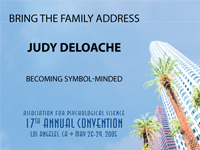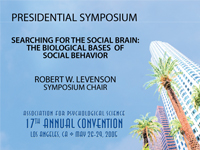Know Thy Self
Self-knowledge is a perennial ideal in philosophy, but one that is seldom if ever attained. Benjamin Franklin wrote in his 1750 Poor Richard’s Almanac that “There are three things extremely hard: steel, a diamond, and to know one’s self.” According to Cornell University psychologist David Dunning, the problem of knowing ourselves hasn’t gotten any easier in 250 years; and it is a problem with real-world, not just philosophical, consequences.
Dunning, lead author of the December 2004 issue of Psychological Science in the Public Interest, “Flawed Self-Evaluation: Implications for Health, Education, and the Workplace,” summarized his report on the accuracy (or rather inaccuracy) of self-knowledge at the APS 17th Annual Convention in May in Los Angeles. Across studies in a range of spheres, the results are clear: “At least in a North American context,” Dunning said, “what people think about themselves tends to be biased and tends to be biased in a positive direction.”
According to Dunning, on the job, at school, or even in managing our own health, it is as though we all live in Garrison Keillor’s fictional Lake Wobegon, “where all the children are above average.” “People tend to hold opinions of themselves that are just too positive given that which is typically possible,” Dunning said. Defying statistical possibility, 94 percent of college professors, for example, rate themselves as doing “above average” work.
Such an inflated view of self can have real consequences, in the area of health. For example, studies show that people generally underestimate their own susceptibility to health problems like high blood pressure, addiction, or cancer. “People tend to think that they’re less vulnerable than the typical other person is,” Dunning said. Partly it’s because people overestimate how different they are from the norm in terms of behaviors that might put them at risk. Also, people adhere to commonsense, plausible-sounding, but erroneous theories about their own health, despite what their doctors tell them: patients persist in the belief that they would be able to tell if they had hypertension, the “silent killer,” even though they have been told it produces no symptoms a person can detect.
Individuals show a similar overconfidence in education, where there is a strong tendency to overestimate one’s mastery of new knowledge and skills. Teachers and peers are generally much better able than a student is to accurately predict performance on tests, for example.
A 1989 study of surgical residents found that, whereas peers’ and supervisors’ ratings of residents’ surgical skills correlated strongly with the residents’ ratings on the American Board of Surgeons in Training Exam, there was virtually no correlation between residents’ performance on the test and their own self-ratings. In short, “other people predict our performance and outcomes better than we do ourselves.”
The work world is full of overconfidence and flawed self-knowledge as well. Employees underestimate how long they will take to complete tasks. CEOs’ and entrepreneurs are overconfident in making business decisions, particularly when venturing into unfamiliar territory such as a business startup or an acquisition — a problem Dunning called “the problem of the new.” The fact that the stock of newly acquired firms tends to drop reflects the familiar discrepancy between inflated self-assessment and the cooler assessment of those who are more objective: “CEOs are confident in their ability to run other companies. A typical result from an outside observer, voting with money, is they actually think it is not a wise decision.”
Although a degree of self-deception may be just part of human nature, individuals aren’t always to blame for their lack of accurate self-knowledge, Dunning indicated: “There are sometimes insurmountable barriers in front of us that would prevent us from knowing who and what we are.” Dunning pointed to social and institutional barriers, such as the difficulty of giving honest critical feedback in workplace settings, as well as to the simple fact that people don’t have access to the full range of human competence and skill against which to evaluate their own. “We’re not aware of the range of things we’re not aware of, by definition,” he said. Also, in many areas, what people are striving for — excellence — is ill-defined.
Dunning suggested that the field of self-assessment has many opportunities for psychologists to suggest correctives to improve the lives of individuals and the success of organizations. Education could be improved, for example: The common technique of massed training — intensive building of a skill through concentrated repetition — produces rapid gains in performance and a high confidence, yet the new knowledge or skills have been shown to erode quickly, leaving a learner with an exaggerated confidence in their abilities. Dunning recommended that massed training bereplaced by distributed training — less intensive, longer-term learning that produces less confidence but more lasting gains.
“I think it would be a terrific thing to actually look at self-assessment, its flaws and potential repairs,” Dunning said, “so that maybe … we could write our own little Poor Richard’s Almanac that might help people know what thingsthey should be alerted to in their own lives, in their own organizations, and to have something we could apply to our own individual lives as well.”




APS regularly opens certain online articles for discussion on our website. Effective February 2021, you must be a logged-in APS member to post comments. By posting a comment, you agree to our Community Guidelines and the display of your profile information, including your name and affiliation. Any opinions, findings, conclusions, or recommendations present in article comments are those of the writers and do not necessarily reflect the views of APS or the article’s author. For more information, please see our Community Guidelines.
Please login with your APS account to comment.